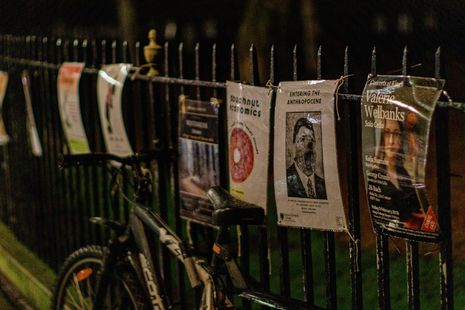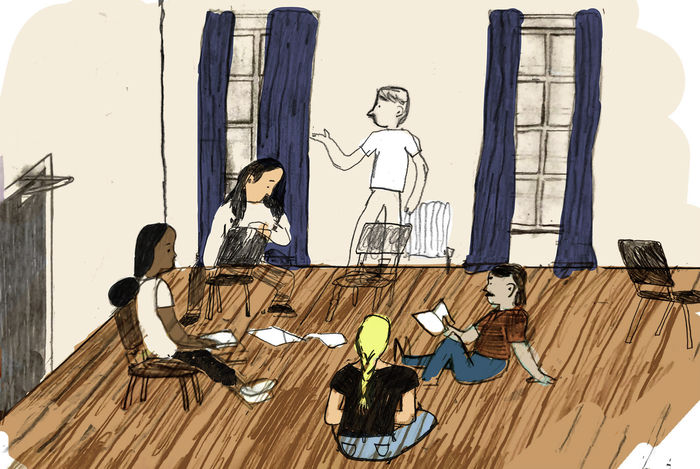Could Cambridge theatre do more for women’s safety?
Elsie Hayward brings attention to a little-discussed access issue with Camdram: the walk home at night

To me, Camdram seems like a pretty female-dominated world. If shows are struggling to find casts, it’s generally for the masculine roles, and gender-blind casting more often results in female actors taking on male parts than the other way around. Add to this the fact that shows are very much evening events, and you wonder why theatre hasn’t been a space for discussing women’s safety at night. This has been the strongest barrier I’ve felt when it comes to participating in Cambridge theatre, and it’s time we acknowledged it and talked about how to combat it.
“It isn’t fair that anyone feels unsafe or even uncomfortable walking the streets of our city”
People are always telling me that Cambridge is a safe city, and I’m sure that’s true in comparison to many others in the UK (just ask my friends from Bradford and Luton). But I’m from a tiny village, and the fact is that I haven’t always felt safe in Cambridge after dark. As students busy putting on shows, we often feel like this city is just our playground — but it’s still a city, with much in common with all the others. It’s full of strangers, and people regularly have bad experiences on its streets. Now, I’ve come to realise that it isn’t the kind of gruesome disaster you see on the news that I fear happening to me — in principle, I know how unlikely that is. What is far more likely is that you have a very uncomfortable interaction with a stranger — like being harassed for money — that leaves you shaken and ruins your evening. This I have experienced, and know many others who have too, so I’m keen to avoid it by whatever means I can.
But this is difficult when one of the most important things to me in Cambridge is theatre. I desperately want to see, and even be in, as many shows as I can, and I don’t want to worry about the walk home afterwards. I know it isn’t the same as getting back from Revs at 3am (although an ADC Lateshow does take you past midnight), however in Michaelmas, it’s darker earlier in the evenings, and I still feel very exposed walking by myself.
“Often I feel like admitting that I need someone to walk me home is a betrayal of my feminist principles”
I thought I was alone in this, and that everyone else was totally unfazed, until I discovered that a very close friend felt the same way. The feeling of validation was enormous: one of the smartest and strongest women I know shared my feelings. I wasn’t just being silly. This is why it’s important that we talk about this in theatre circles, so that no one feels like their feelings are unreasonable, or they have to deal with it by themselves.
It isn’t fair that anyone feels unsafe or even uncomfortable walking the streets of our city. This shouldn’t be the case. But sadly, it is, so we need measures to deal with it. Often I feel like admitting that I need someone to walk me home is a betrayal of my feminist principles, or just embarrassing — but it’s being sensible and true to myself. So the Camdram world can do better at helping out. The fact is, that whenever I think about auditioning for a show, I have to think about how I would get home each night, so it’s a genuine access issue. Unfortunately, there’s no straightforward step to fix it — only the gradual and nebulous work of building a culture.
This needs to be a culture where we take care of each other, and where looking to other people for help is normalised. This means those with privilege (yes, men) using it to help others feel safe. I have wonderful male friends who are always offering to come and walk me home if I need, but I still think a lot of men don’t think about what it’s like for people of other genders. I don’t know statistically if they’re much safer, but the big difference is they feel safer. So, if you’re a man: see if you can save others the awkwardness of asking if you’ll walk them home, and don’t act like it’s a big favour. I’d love to start working on a show in the knowledge that I wasn’t going to be left high and dry. Directors can help with this too, by checking to make sure no-one’s walking home alone and, as a leader, buddying them up if necessary. You could make this a part of the work of your welfare officer if you have one (more valuable work than buying snacks, dare I say).
From the start, make it clear that you expect your cast to look out for each other, and at least bring the issue up to make others feel comfortable discussing it and making arrangements. Put it on the agenda for your cast and crew meeting. That way, no one will avoid staying late in the ADC bar after closing night for fear of the walk home.
 News / Caius mourns its tree-mendous loss23 December 2025
News / Caius mourns its tree-mendous loss23 December 2025 Comment / Yes, I’m brown – but I have more important things to say22 December 2025
Comment / Yes, I’m brown – but I have more important things to say22 December 2025 News / Cambridge welcomes UK rejoining the Erasmus scheme20 December 2025
News / Cambridge welcomes UK rejoining the Erasmus scheme20 December 2025 News / CUP announces funding scheme for under-represented academics19 December 2025
News / CUP announces funding scheme for under-represented academics19 December 2025 Interviews / Politics, your own way: Tilly Middlehurst on speaking out21 December 2025
Interviews / Politics, your own way: Tilly Middlehurst on speaking out21 December 2025










